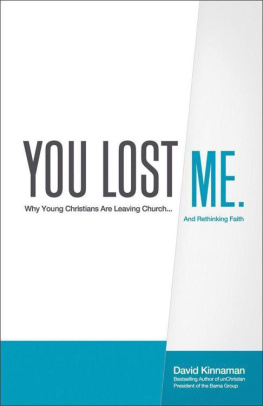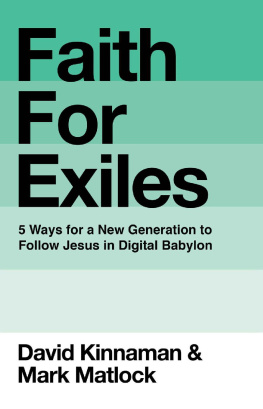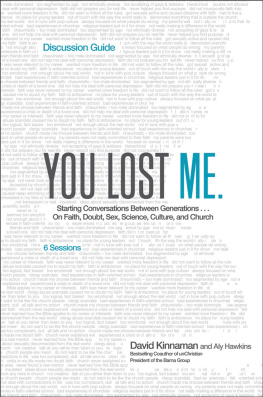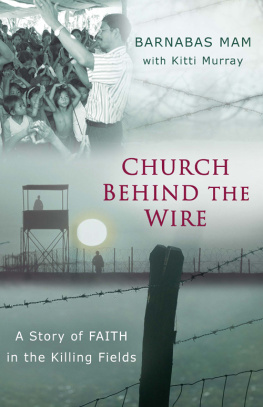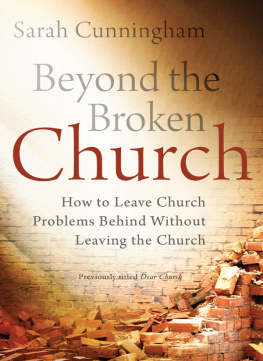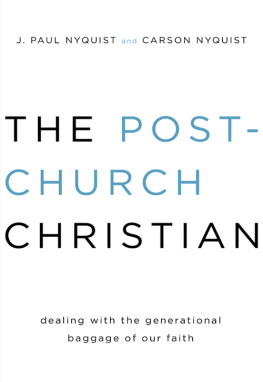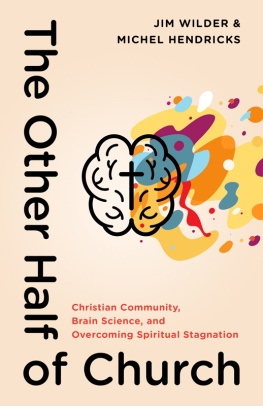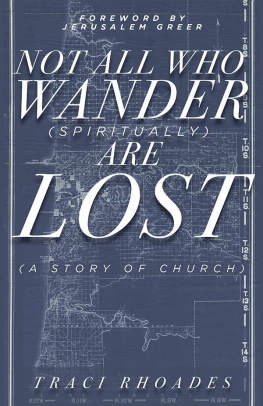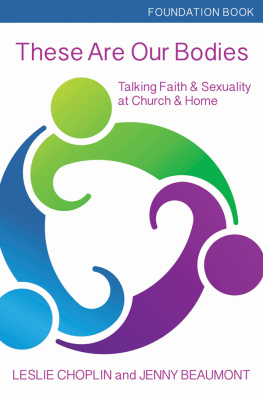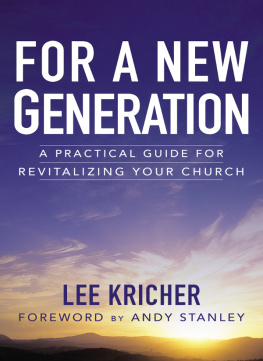
2011 by David Kinnaman
Published by Baker Books
a division of Baker Publishing Group
P.O. Box 6287, Grand Rapids, MI 49516-6287
www.bakerbooks.com
Ebook edition created 2011
All rights reserved. No part of this publication may be reproduced, stored in a retrieval system, or transmitted in any form or by any meansfor example, electronic, photocopy, recordingwithout the prior written permission of the publisher. The only exception is brief quotations in printed reviews.
ISBN 978-1-4412-1308-2
Library of Congress Cataloging-in-Publication Data is on file at the Library of Congress, Washington, DC.
Unless otherwise indicated, Scripture quotations are from the Holy Bible, New International Version. NIV. Copyright 1973, 1978, 1984, 2011 by Biblica, Inc. Used by permission of Zondervan. All rights reserved worldwide. www.zondervan.com
Scripture quotations labeled NLT are from the Holy Bible , New Living Translation, copyright 1996, 2004, 2007 by Tyndale House Foundation. Used by permission of Tyndale House Publishers, Inc., Carol Stream, Illinois 60188. All rights reserved.
Scripture quotations labeled Message are from The Message by Eugene H. Peterson, copyright 1993, 1994, 1995, 2000, 2001, 2002. Used by permission of NavPress Publishing Group. All rights reserved.
To protect the privacy and confidentiality of those who have shared their stories with the author, some details and names have been changed.
To the previous generation
Donald Kinnaman (19211997) Esther Kinnaman (19252008)
Walter Rope (19171999) Irene Rope (19211991)
and to the next
Emily Kinnaman (1999) Annika Kinnaman (2001)
Zachary Kinnaman (2004)
Grant Culver (2003) Lauren Culver (2005)
Kaitlyn Culver (2007) Luke Culver (2009)
Baby Kinnaman (2011)
Grace Kinnaman (2009) Isaac Kinnaman (2011)
Ellie Kinnaman (2010)
Sydnee Michael (2010)
Josh Rope (1995) Abi Rope (1997) Sarah Rope (1999)
Psalm 100:5
For the L ord is good and his love endures forever;
his faithfulness continues through all generations.
Contents
You Lost Me, Explained
I t feels as if they are reading from a script.
Young adults describe their individual faith journeys in startlingly similar language. Most of their stories include significant disengagement from churchand sometimes from Christianity altogether. But its not just dropping out that they have in common. Many young people who grew up in church and have since dropped out do not hesitate to place blame. They point the finger, fairly or not, at the establishment: you lost me .
Anna and Chris are two such young people. I met them on a recent trip to Minneapolis. Anna is a former Lutheran, now an agnostic. After years of feeling disconnected, she was pushed away, finally, by the fire and brimstone sermon the pastor preached at her wedding ceremony. Chris is a former Catholic who became an atheist for several years, in part because of how the church handled his parents divorce.
I met Graham on another business trip. A natural-born leader, he was attending a program for Christian students. Yet he confessed, Im not sure I really believe all this stuff anymore. When I pray I feel like Im just talking to thin air.
As I was finishing the final edits on this book, I ran into Liz, a twentysomething from my home church in Ventura, California. When she was in high school, I had been an adult volunteer in the youth group. She said that, despite her upbringing in church and attendance at a Christian college, she had been struggling with feelings of isolation and judgment from her Christian peers. She had met a family from another religious faith and was impressed by them. A few weeks ago I decided to convert and join them.
Each story is unique, yet they have much in common with the unique stories of thousands of other young adults. The details differ, but the theme of disengagement pops up again and again, often accompanied by a sense that the decision to disconnect was out of their hands. A colleague of mine forwarded an article about Catholicisms loss of so many young people. Among the online comments, these two stood out:
I wonder what percentage of... Lost Catholics feel like I do, that we did not leave the Church, but rather, the Church left us.
I hung in for a long while, thinking that fighting from within was the way to go, but I ultimately realized that it was damaging my relationship with God and my relationship with myself and I felt no choice but to leave.
The familiar themes that emerge from such stories do not make them any easier for parents and church leaders, who have poured much effort and prayer into young lives, to hear. In fact parents descriptions of the you-lost-me phenomenon are also eerily similar. An earnest mom, Pam, stopped me after a conference. Her question: what should she do about her engineering-student son, who after being a committed Christ-follower for many years was now having significant doubts about the relevance and rationale of Christianity?
I had lunch with another Christian parent who was at the point of tears because his nineteen-year-old son had announced that he did not want anything to do with his parents faith. David, I cant explain the loss we feel about him. I am hopeful that he will return to faith because I see how good and generous he is. But its so difficult for his mother and me. And I can barely stand the way his negative choices are affecting our younger kids. Its all I can do not to ask him to leave our home.
THE STRUGGLES OF YOUNG CHRISTIANS
If you read my previous book, unChristian , written with Gabe Lyons, you may wonder where this new project fits with that research. unChristian looks at the reasons young non-Christians reject the Christian faith and explores the changing reputation of Christians, especially evangelicals, in our society. That book focuses on the perceptions and priorities of young non-Christians, or outsiders , as we called them.
You Lost Me , on the other hand, is about young insiders . At its heart are the irreverent, blunt, and often painful personal stories of young Christiansor young adults who once thought of themselves as Christianswho have left the church and sometimes the faith. The books title is inspired by their voice and mindset, and reflects their disdain for one-sided communication, disconnect from formulaic faith, and discomfort with apologetics that seem disconnected from the real world. You Lost Me is about their perceptions of churches, Christianity, and culture. It gives voice to their concerns, hopes, delusions, frustrations, and disappointments.
A generation of young Christians believes that the churches in which they were raised are not safe and hospitable places to express doubts. Many feel that they have been offered slick or half-baked answers to their thorny, honest questions, and they are rejecting the talking heads and talking points they see among the older generations. You Lost Me signals their judgment that the institutional church has failed them.
Whether or not that conclusion is fair, it is true that the Christian community does not well understand the new and not-so-new concerns, struggles, and mindsets of young dropouts, and I hope that You Lost Me will help to bridge this gap. Because of my age (thirty-seven) and my position as a researcher, I am often asked to explain young people to older generations and advocate for their concerns. I welcome the task because, whatever their shortcomings, I believe in the next generation. I think they are important, and not just because of the clich young people are the leaders of tomorrow.

